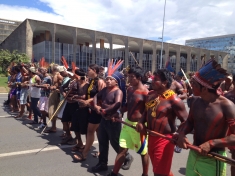Brazilian Civil Society Unites in Response to Corruption Scandal
Last week, Brazilian President Dilma Rousseff announced an agenda of legislative measures – together with a huge investment package for the energy sector – in a desperate attempt to stymie calls for her impeachment. The political crisis of Dilma’s administration is directly linked to a massive corruption scandal involving Petrobras, the parastatal oil company, and Brazil’s powerful dam industry. Rather than address the underlying causes of the crisis, Dilma’s government has opted to pursue more of the same policies, including destructive dams in the Amazon. Fortunately, Brazilian citizens are fighting back, calling for real solutions to a multifaceted crisis that involves, above all, issues of democracy, governance and ethics in politics.
The so-called “Agenda Brasil,” unveiled last week by Dilma and Senate President Renan Calheiros, includes a list of legislative measures and other priority actions that were negotiated with party bosses of the center-right PMDB party and powerful financial and corporate interests. While apparently attempting to reassure the Brazilian people that their elected officials do something besides line their pockets, “Agenda Brazil” actually prioritizes improving the business climate for private investors in large mining and infrastructure projects, including the dam industry. The plan calls for rolling back legislation that limits exploitation of indigenous lands and other protected areas, including Brazil’s coastline of over 5,000 miles, while fast-tracking environmental licensing of major infrastructure projects, with tight deadlines for approval of licenses.
Launched on the same day as Agenda Brasil, a US$ 54 billion package of investments for the electrical energy sector runs through December 2018 (the end of Dilma’s term of office) and prioritizes the previously-announced construction of the controversial São Luiz do Tapajós and Jatobá dams on the Tapajós River, with an initial price tag of US$ 10.4 billion. The program also reiterates the government’s intention to alter legislation to fast-track environmental licensing of mega-dams and similar projects.
In response, a broad coalition of Brazilian NGOs and social movements has issued public statements that sharply criticize both the Agenda Brasil and the "Program for Investments in Electrical Energy." The groups, including International Rivers – Brazil, question attempts to backtrack on hard-won gains in defending human rights and the environment, which were enshrined in Brazil’s 1988 Constitution following 21 years of military rule. Instead, we find the Brazilian government promoting “solutions” that cater to the same narrow interests that created the country’s multifaceted crisis in the first place.
The energy investment program, which insists on a failed model of mega-dam construction in the Amazon, is particularly outrageous. It ignores the lessons of Belo Monte and other recent projects that have been social, environmental and economic disasters. At the same time, it increases the vulnerability of Brazil’s energy matrix to droughts which have worsened with climate change.
In the case of the proposed Tapajós dams, Rousseff’s administration has continually refused to recognize the territorial rights of the Munduruku people, including the Sawre Muybu territory that would be unconstitutionally flooded by the São Luiz do Tapajós dam. Worse still, it continues to flout legally-required processes of free, prior and informed consent with indigenous peoples and other traditional communities threatened by proposed dam projects.
According to the civil society groups, such insistence on misguided projects and blatant disregard for the rule of law can only be explained by authoritarian planning and the central role of mega-projects in fuelling massive corruption schemes involving large construction companies, high-level technocrats and political party bosses. All of this has been revealed by recent investigations by the Federal Police and Public Prosecutors as part of Operation Lava Jato.
While criticizing the federal government’s doubling down on destructive dams, fossil fuels and nuclear energy, the coalition of civil society groups also questions the program’s timid goals for expanding renewable energy (solar, wind and biomass) and its neglect of measures to promote energy conservation and efficiency.
With hundreds of thousands of protestors rocking the country with calls for her impeachment, the popularity of Dilma’s government is in a free fall. The government is beholden to narrow political and economic interests and seemingly unable to dialogue with organized civil society. Rousseff’s government seems to be playing out a Greek tragedy, insisting on repeating errors that will only make matters worse for itself, not to mention Brazil as a whole.
There are positive signs that the current Brazilian crisis may lead to positive change, especially in terms of governance and ethics in the public sector. Surely, such change may only originate from below, involving alliances among a variety of actors in Brazilian society: indigenous peoples and other traditional populations, social movements, NGOs, independent academics, progressive members of Congress and other public servants who have maintained their integrity and refused to play politics with people’s lives and the country’s future.
Read the CIvil Society Manifesto on Agenda Brazil (English translation) and the Public Letter on Program for Investments in Electrical Energy (in Portuguese), and watch this space for updates!
- Greenpeace Brazil: A Agenda que não enxerga o Brasil (Portuguese)
- INESC: A (des) Agenda Brasil desmonta o Estado e retira direitos dos brasileiros (Portuguese)
- Márcio Santilli - ISA: Culpa dos Índios? (Portuguese)
- Articulação dos Povos Indígenas do Brasil: Apib divulga manifesto contra a Agenda Brasil (Portuguese)





